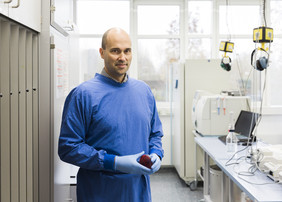From lab to patient: Ralf Ehricht strengthens the transfer from research to practice at Leibniz IPHT

It takes a long time for technological solutions from research to reach the patient: on average, it takes around 14 years for them to be applied in practice. One of the main goals of the Leibniz Institute of Photonic Technology (Leibniz IPHT) in Jena is to accelerate this translation process from idea to product. In the newly founded research department “Optical Molecular Diagnostics and Systems Technology”, a team led by the experienced industrial researcher Ralf Ehricht is working on new methods for the diagnosis of infectious diseases and social health risks. Mr. Ehricht, who previously worked as a project manager at the Jena diagnostics company Abbott (Alere Technologies GmbH), was appointed professor by the Friedrich Schiller University Jena and the Leibniz IPHT. Ralf Ehricht took up his new position at Leibniz IPHT as one of the world’s leading research institutions in the field of optical health technologies in December 2018.
From industry to science: By German standards, it is an unusual change that Ralf Ehricht has now completed. The reason? “Curiosity”, says the biochemist with a doctorate. Since 2006, Mr. Ehricht has been head of the research and development department “Feasibility Studies” at Alere Technologies, today part of the global Abbott Group. He was responsible for the production of the ArrayTube and ArrayStrip platforms, which are used for genome analysis. “I am interested in the opportunity to work at Leibniz IPHT in an interdisciplinary way and with different technologies,” Ralf Ehricht says. He will set up working groups for two research priorities: “We want to research optical-molecular tools for clinical microbiological diagnostics and the epidemiology of infectious diseases. And we want to link the results with system technology solutions and thus transfer them into processes with a high degree of technological maturity.“ Mr. Ehricht wants to build a bridge to industrial partners aiming at jointly implementing innovative and available products for diagnostics and therapy.
In this way, Leibniz IPHT strengthens the targeted translation of research results into applicable solutions — from the laboratory table to the patient’s bed. This enables us to bring innovations for diagnostics and therapy to the healthcare market more quickly,” explains Jürgen Popp, scientific director of the institute. Ralf Ehricht researches infectious diseases and their epidemiology. “We want to understand how resistance to antibiotics comes about in order to avoid them. To do this, he relies on modern bioinformatic methods. Ralf Ehricht also has an exemplary vision of what he would like to develop next on this basis: a traffic light for vaccinations. Available tests for everyone that can tell from a drop of blood whether a patient is still immune to mumps, measles, rubella, diphtheria, tetanus, whooping cough and other vaccine-preventable diseases — or which vaccinations should be refreshed.
In order to research point-of-care applications that enable doctors and patients to carry out diagnostic examinations on site rather than via a central laboratory, Ralf Ehricht hopes to develop solutions with industrial partners. He sees his InfectoGnostics research campus in Jena, to which Leibniz-IPHT belongs, as a successful model for the future: a public-private partnership in which more than 30 representatives from science, medicine and industry research and develop marketable solutions for infection diagnostics. “What is often missing in the cooperation between industry and science is simple language mediation,“ Mr. Ehricht observes.
Following his doctorate at the Institute for Molecular Biochemistry at the Friedrich Schiller University in Jena, Ralf Ehricht joined Clondiag Chip Technologies GmbH in 1998 as one of the first employees. As scientific project and group leader for assay, device and product development, he helped to expand the Jena-based diagnostics company from five to more than 550 employees until 2006. It all began at a laboratory table in the laser technology building of the Leibniz-IPHT, where Eugen Ermantraut started Clondiag as a spin-off from the institute. With his arrival at Leibniz-IPHT, Ralf Ehricht thus closes a circle. And today he is working with Eugen Ermantraut again, who is now CEO of Blink. Their common goal: “To get products out on the street”.
Contact
Related News
Third party cookies & scripts
This site uses cookies. For optimal performance, smooth social media and promotional use, it is recommended that you agree to third party cookies and scripts. This may involve sharing information about your use of the third-party social media, advertising and analytics website.
For more information, see privacy policy and imprint.
Which cookies & scripts and the associated processing of your personal data do you agree with?
You can change your preferences anytime by visiting privacy policy.


